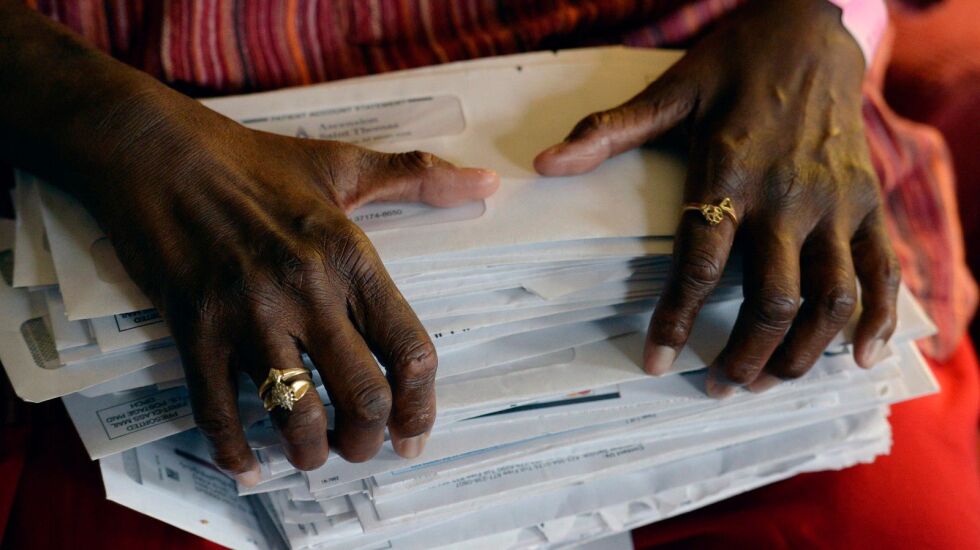
A new report details the devastation medical debt causes Illinois families — particularly immigrant and Black communities — causing stress that has hurt their health and depleted their savings. The study aims to fuel support for a proposed state law the authors of the report tout as a win-win for both uninsured patients and the hospitals that treat them.
The report from the Illinois Coalition of Immigrant and Refugee Rights, Legal Council for Health Justice and Community Catalyst describes multiple instances in which patients racked up big bills and the emotional toll that takes because they didn’t know hospitals could have offered them financial assistance. Mandating the screening of patients and identifying those who could benefit from financial help could help alleviate the problem, the authors found.
One of the examples seeks to illustrate the difference between hospital policies through “Ms. Yvette,” who has more than $15,000 in debt from a health care crisis in 2022. The first hospital where she received care did not connect her with financial assistance, and she has been receiving reminders of her medical bills ever since. The second hospital where she was treated helped her get financial assistance that covered the full cost of her surgery and follow-up doctor’s appointments, the report said.
The report changed the names of patients to protect their identities and to respect ongoing negotiations over bills with the hospitals that treated them.
“Medical debt has been growing in immigrant and Black communities for far too long,” according to the report. “As one of our partner’s community health workers said, ‘I wish they could see the faces of community members who are carrying this medical debt. The stress that they have to carry is unbearable.’ We cannot stand aside as we watch our communities suffer from preventable medical debt.”
In Illinois, organizations behind the report support a proposed state law that calls for hospitals to screen uninsured patients for financial assistance and help them apply for it. Patients who are eligible for publicly-funded Medicaid health insurance or hospital discounts, for example, couldn’t be steered toward collections for not paying their bills.
The argument is two-fold: Screening would not only reduce medical debt for patients, but also hospitals would get paid for treatment they provide and now don’t get fully paid for.
Currently, hospitals are not required to screen uninsured patients — only to tell them help exists.
“What is required is for hospitals to have a sign, for hospitals to put something in a person’s bill around charity care (or discounted care), and to inform them,” said Luvia Quinones, senior director of health policy at the Illinois Coalition for Immigrant and Refugee Rights. “But it doesn’t say how, when or where.”
In a statement, a spokeswoman for the Illinois Hospital Association, an influential industry lobbying group, said hospitals care for patients “24/7, regardless of their ability to pay,” and make great efforts to provide discounted care or qualify patients for financial assistance. The IHA is working to reach an agreement with sponsors of the proposed legislation and stakeholders involved, spokeswoman Paris Ervin said in the statement.
There’s apparently a large pool of people who the proposed legislation could protect. More than 900,000 Illinois residents younger than 65 are uninsured, and just over one-third could be eligible for Medicaid — yet not enrolled, the state estimated in a 2021 study.
The report also points out that nonprofit hospitals get what can be lucrative property tax breaks in exchange for providing discounted care, yet they aren’t helping patients enough to prevent them from spiraling into medical debt. The organizations behind the study are part of a national campaign calling for President Joe Biden’s administration to better protect patients and hold health systems accountable for the tax breaks they receive.
WBEZ has documented how in many cases, hospital financial policies in Illinois don’t extend to every doctor who treats patients, leading to big bills for low-income and uninsured patients.
Nearly one in 10 adults in the U.S. has “significant” medical debt — defined as owing more than $250 — totaling at least $195 billion, according to the Peterson-KFF Health System Tracker.
Locally, in recognition of the mushrooming problem, Cook County plans to erase up to $1 billion in medical debt for residents. The county and Chicago also each have their own guaranteed income programs. Participants in the city’s program said paying bills, reducing their debt and saving money were their top needs, according to a study.
Kristen Schorsch covers public health and Cook County government for WBEZ. Follow her @kschorsch.







